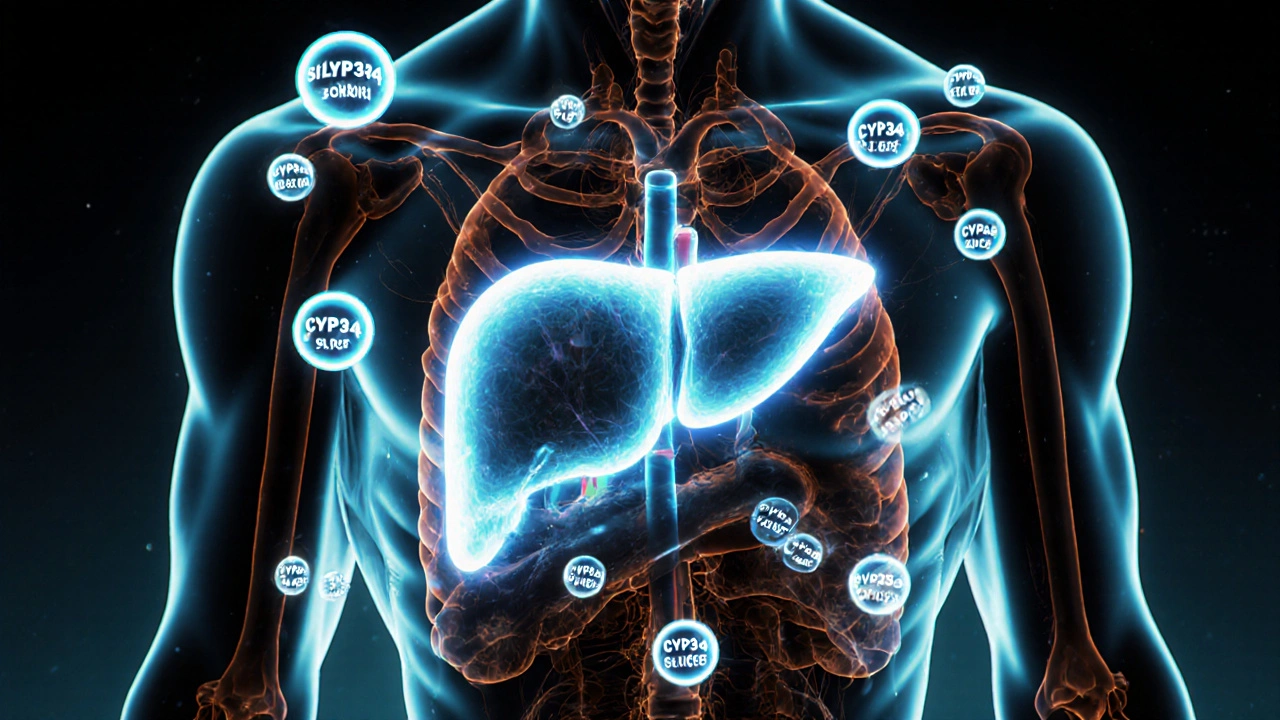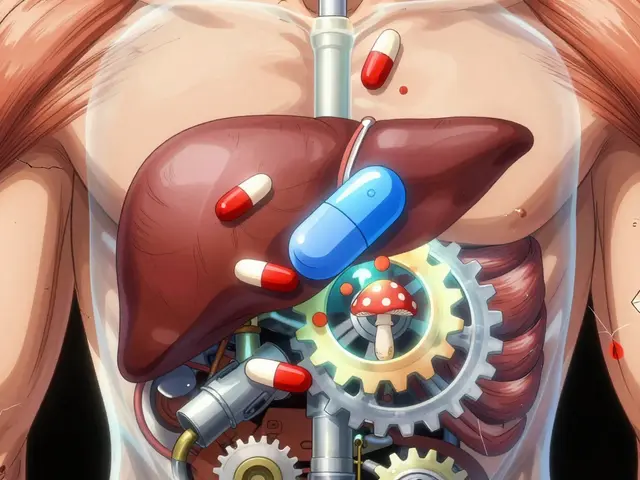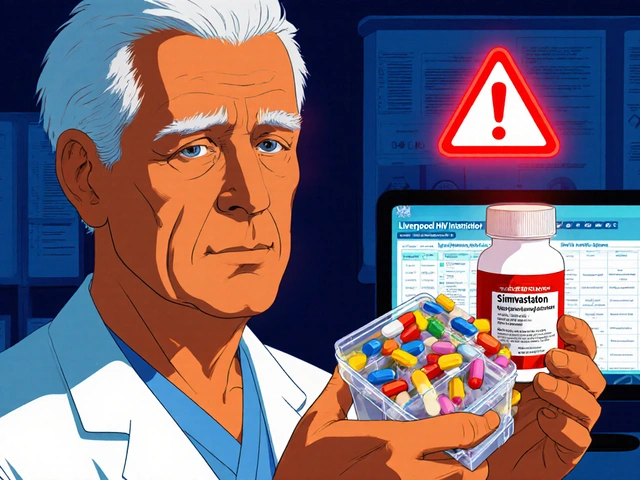Milk Thistle Drug Interaction Checker
Milk thistle can interact with drugs metabolized by cytochrome P450 enzymes (CYP3A4, CYP2C9, CYP2D6), which process about 80% of all prescription medications. This checker identifies potential interactions based on enzyme pathways. Remember: This is for informational purposes only and not medical advice. Always consult your healthcare provider before combining supplements with medications.
Check Your Medications
Interaction Results
Risk Level:
People take milk thistle for their liver. It’s one of the most popular herbal supplements out there - especially for those with fatty liver, alcohol-related liver stress, or just wanting to feel like they’re giving their body a reset. But here’s the thing most supplement labels don’t tell you: milk thistle doesn’t just sit quietly in your liver. It talks to your drug-metabolizing enzymes. And that conversation can change how your medications work - sometimes dangerously.
How Milk Thistle Actually Works in Your Liver
Milk thistle’s power comes from silymarin, a mix of plant compounds, mostly silybin. You’ll find it in capsules, tablets, and liquid extracts, usually standardized to 70-80% silymarin. Most people take 140 mg to 420 mg a day. That’s what studies use. That’s what brands sell. But here’s the catch: your body doesn’t absorb it well. Only 20-50% of silybin makes it into your bloodstream. And even then, how it behaves depends on your genes, your liver health, and how long you’ve been taking it.
For decades, milk thistle was thought to just protect liver cells from toxins. That’s still true. But in the last 15 years, researchers found it also messes with the liver’s drug-processing system - the cytochrome P450 enzymes. These enzymes, especially CYP3A4, CYP2C9, and CYP2D6, handle about 80% of all prescription drugs. They break down statins, blood thinners, antidepressants, seizure meds, and even some cancer drugs. When milk thistle interferes, it can make those drugs build up to toxic levels… or get cleared too fast and stop working.
The Confusing Science: Inhibition vs. Induction
Here’s where it gets messy. Milk thistle doesn’t just block enzymes. Sometimes it boosts them. And the timing matters.
Early studies showed silymarin blocks CYP2C9. That’s the enzyme that breaks down warfarin (Coumadin), phenytoin, and some NSAIDs. One 2021 lab study found a 15-23% drop in CYP2C9 activity with standard doses. That sounds scary - especially if you’re on warfarin. A small change in how fast your body clears it can spike your INR, leading to bleeding.
But then came the clinical trials. In 2019, researchers gave 420 mg of silymarin daily to 24 healthy volunteers for two weeks. They checked midazolam levels - a drug processed by CYP3A4. Result? A 7.2% increase in drug exposure. Not even close to the 20% threshold doctors consider clinically meaningful. So, no real risk with CYP3A4? Maybe.
Then in 2020, another study found something wild: after 28 days of milk thistle, CYP2C9 activity actually went up by 12.7%. That’s induction - the opposite of inhibition. So, for the first few days, milk thistle might slow down drug metabolism. After two weeks, it might speed it up. That’s not a bug. It’s a feature of how the liver adapts. And it’s why some people feel fine for months, then suddenly have a bad reaction.
Who’s at Real Risk?
Not everyone needs to panic. But if you’re on any of these drugs, you need to talk to your doctor before starting milk thistle:
- Warfarin - Even small changes in INR can cause bleeding or clots. Reddit users report INR spikes after starting milk thistle. Some needed dose changes of 15-35%.
- Phenytoin - Used for seizures. Too much = toxicity (tremors, confusion). Too little = seizures.
- Statins - Like atorvastatin or simvastatin. CYP3A4 is involved. Theoretically, milk thistle could raise levels and increase muscle damage risk. Real-world evidence is weak, but doctors still advise caution.
- Immunosuppressants - Cyclosporine, tacrolimus. These have narrow therapeutic windows. A 10% change in blood level can mean transplant rejection or kidney damage.
- Some antidepressants and anti-anxiety meds - Especially those metabolized by CYP2D6 or CYP2C9.
On the flip side, milk thistle appears safe with many common drugs. A 2023 user report on Drugs.com described taking 420 mg daily with sofosbuvir/velpatasvir (hepatitis C treatment) for 12 weeks - no issues. Studies on direct-acting antivirals show minimal interaction. Same with metformin, thyroid meds, and most blood pressure drugs.

What the Experts Disagree On
Dr. Joseph Pizzorno, a leading voice in integrative medicine, says the risk is overblown. He points to only 12 documented case reports in 40 years - and none proved causation. He argues that if milk thistle were truly dangerous with warfarin, we’d see hundreds of cases.
Dr. David S. Bernstein, a hepatologist, disagrees. He says the data is too inconsistent. Standardized extracts? Rare. Label accuracy? Only 32% of supplements match their claims. Dosing? All over the place. He tells his patients: if you’re on a narrow-therapeutic-index drug, skip it. No gray area.
The European Medicines Agency says no clinically relevant interactions are expected. The U.S. NIH’s LiverTox database says milk thistle is “possibly interacting” with CYP2C9 substrates - and “likely safe” with most others. That’s not a clear answer. It’s a warning sign.
Real-World Data: What Patients Are Actually Experiencing
Look at the numbers. Amazon reviews for top milk thistle products: 2.1% mention drug interactions. That’s low. But Reddit threads? One thread on r/Supplements with 87 comments - 43 people reported altered INR levels. 28 needed warfarin dose changes. That’s not noise. That’s a signal.
The FDA’s Adverse Event Reporting System logged 47 possible milk thistle-drug interaction reports between 2018 and 2023. Only 9 were confirmed. That’s a low rate - but each one could be life-threatening.
And here’s the kicker: 37% of patients asking doctors about milk thistle on HealthTap specifically mention statins. Yet, there’s almost no solid evidence of interaction. That’s a gap between perception and science. Patients hear rumors. Doctors don’t always have the data.

What You Should Do - Practical Steps
If you’re considering milk thistle - or already taking it - here’s what to do:
- Know your meds. Are you on warfarin, phenytoin, cyclosporine, or a statin? If yes, don’t start milk thistle without talking to your doctor or pharmacist.
- Don’t assume “natural” means safe. Natural doesn’t mean harmless. Silymarin is a bioactive compound - not a vitamin.
- Check your supplement. Only 32% of brands meet their label claims. Look for third-party testing (USP, NSF, ConsumerLab).
- Monitor. If you’re on warfarin, get your INR checked weekly for the first month after starting milk thistle. For phenytoin or immunosuppressants, ask for a blood level test at day 3, day 7, and day 14.
- Wait. If you’re switching from another liver supplement, wait 48 hours before starting milk thistle. This gives your enzymes time to reset.
- Track your symptoms. Unexplained bruising? Fatigue? Dizziness? Muscle pain? These could be signs your drug levels are off.
The Bigger Picture
Milk thistle isn’t going away. The global market is growing fast - projected to hit $285 million by 2030. It’s used by over 40% of people with fatty liver disease. But the system isn’t ready. Supplements aren’t held to the same standards as drugs. Labels lie. Doctors aren’t trained. Patients are left guessing.
Future solutions are coming. Researchers are testing silybin-phosphatidylcholine complexes that may reduce enzyme interactions while keeping liver benefits. Pharmacogenomic testing - checking your CYP gene variants - could one day tell you if you’re at high risk. But that’s not here yet.
Until then, the safest approach is simple: milk thistle isn’t harmless. It’s a liver modulator. And if you’re on medications that your liver processes, you need to treat it like a drug - not a tea.
Can milk thistle raise my INR if I’m on warfarin?
Yes, it can. Multiple user reports and some clinical evidence show that milk thistle can interfere with warfarin metabolism by inhibiting CYP2C9, potentially increasing INR and bleeding risk. If you’re on warfarin and start milk thistle, get your INR checked weekly for the first month. Never adjust your warfarin dose on your own.
Does milk thistle interact with statins?
The risk is theoretical. Statins like simvastatin and atorvastatin are processed by CYP3A4, and milk thistle has shown mixed effects on this enzyme. Most studies show no significant interaction, but some doctors still advise caution, especially with high doses or in people with muscle sensitivity. Monitor for unexplained muscle pain or weakness.
How long does it take for milk thistle to affect liver enzymes?
Inhibition (slowing enzyme activity) can happen within 24-48 hours. Induction (speeding up enzyme activity) takes longer - usually 7-10 days of consistent use. This means effects can change over time, even if you’ve been taking it for months without issues.
Is milk thistle safe with hepatitis C meds?
Yes, current evidence suggests it’s safe. Direct-acting antivirals like sofosbuvir/velpatasvir aren’t significantly metabolized by CYP enzymes affected by milk thistle. Multiple clinical reports and user experiences confirm no interactions. Still, always check with your hepatologist.
Should I stop milk thistle before surgery?
Yes. Many surgeons recommend stopping all herbal supplements - including milk thistle - at least 7-10 days before surgery. This reduces the risk of unexpected bleeding (if on blood thinners) or altered drug metabolism during anesthesia. Always disclose all supplements to your surgical team.
Are all milk thistle supplements the same?
No. Only about 32% of supplements on the market meet their labeled silymarin content. Some contain fillers, contaminants, or far less active ingredient than advertised. Look for products with USP, NSF, or ConsumerLab verification. Avoid unbranded or ultra-cheap options.
Can milk thistle help my liver while I’m on medication?
It may, but only if the medication isn’t affected. Milk thistle has proven benefits for non-alcoholic fatty liver disease (NAFLD), improving liver enzymes in over 65% of studies. But if you’re on warfarin, phenytoin, or immunosuppressants, the potential benefit may not outweigh the risk. Talk to your doctor about alternatives like vitamin E or lifestyle changes.









Write a comment
Your email address will be restricted to us